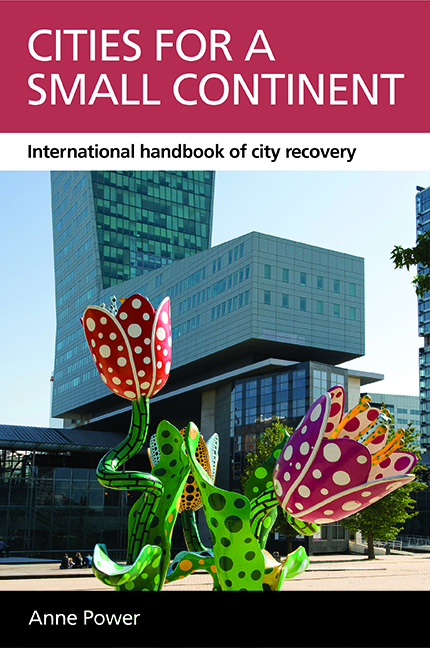Book contents
- Frontmatter
- Contents
- List of tables and figures
- Abbreviations and acronyms
- Acknowledgements
- Copyright material
- Foreword
- one Lessons from cities in a crowded continent Tale of a city – Bilbao
- two Divided and united Europe Tale of a city – Belfast
- three Grit and vision Tale of a city – Sheffield
- four Struggle and strive Tale of a city – Lille
- five Threats and opportunities Tale of a city – St Étienne
- six Over-scale and under-scale Tale of a city – Torino
- seven The power of social innovation Tale of a city – Leipzig
- eight Shoots of growth in older industrial cities in the US Tale of a city – Detroit
- nine Finding new ways out of the woods
- Endnotes
- References
- Afterword
- La Fabrique de la Cité
- Index
nine - Finding new ways out of the woods
Published online by Cambridge University Press: 01 September 2022
- Frontmatter
- Contents
- List of tables and figures
- Abbreviations and acronyms
- Acknowledgements
- Copyright material
- Foreword
- one Lessons from cities in a crowded continent Tale of a city – Bilbao
- two Divided and united Europe Tale of a city – Belfast
- three Grit and vision Tale of a city – Sheffield
- four Struggle and strive Tale of a city – Lille
- five Threats and opportunities Tale of a city – St Étienne
- six Over-scale and under-scale Tale of a city – Torino
- seven The power of social innovation Tale of a city – Leipzig
- eight Shoots of growth in older industrial cities in the US Tale of a city – Detroit
- nine Finding new ways out of the woods
- Endnotes
- References
- Afterword
- La Fabrique de la Cité
- Index
Summary
Given the irreversibility, the relatively modest overall levels of investment required … and the potentially very large co-benefits of action, we can surely be confident in saying the costs of inaction are much higher than the costs of action … much of what is likely to be necessary will have a strong community focus.
Nicholas Stern, Why Are We Waiting?Box 9.1: Green cities – four short stories
Detroit's imposing Art Nouveau railway station, closed since 1988, may become a 16 storey, stacked market garden, growing vegetables and salad for the local farmers’ market. In an urban food desert, food growing makes sense. All the hype about Detroit's decline overlooks the promise and potential of a green and liveable city. Around 300 green, open spaces replace what were once well laid-out, built-up streets. Many have become urban farms. Urban agriculture and tree planting are one of Detroit's new enterprises. So is land reclamation for environmental and ecological reasons.
Industrial cities remind us not of woodland, but of smoke stacks and ‘satanic mills’. Yet Sheffield, the archetypal industrial city in England's northern manufacturing heartland, a pioneer in the industrial revolution, sometimes called England’s ugliest city, has 2 million urban trees, more per citizen than any other city in Europe. Sheffield borders the Peak District National Park, where, before its creation in the 1930s, workers from Sheffield, Manchester and other industrial cities invaded the protected moorland in a mass trespass to open up the grouse shooter's private land to city dwellers, and changing for posterity the way a shrinking natural environment is shared.
The city has 170 woodlands within its borders, 80 of them ancient, dating from long before Sheffield's urban-industrial explosion. Its early 19th century botanical gardens and its 21st century, glass-covered Winter Garden, with 2500 trees, shrubs and flowers from around the world, show the value of green, shared spaces within cities. They make cities cleaner, quieter, cooler and they absorb CO2, helping to combat climate change. Seven public parks are packed within this dense city, built on seven hills. Today, Sheffield's residents are fighting in the terraced and semi-detached city streets to stop private contractors chopping down mature trees, which lock up thousands of tonnes of carbon, on the basis that mature trees are more expensive to maintain.
- Type
- Chapter
- Information
- Cities for a Small ContinentInternational Handbook of City Recovery, pp. 281 - 306Publisher: Bristol University PressPrint publication year: 2016



